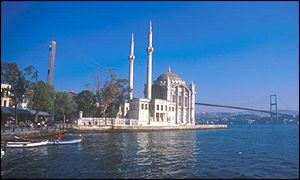Turkey Ranks Last on OECD's Better Life List
 World Bulletin/News Desk - Although Turkey has made considerable progress in improving the quality of life of its citizens over the last two decades, it has ranked last among 34 nations based on a large number of criteria on the "Better Life Index" of the Organization for Economic Cooperation and Development (OECD). According to the OECD index, which is based on data from the United Nations, individual governments and other sources, the average household net-adjusted disposable income in Turkey is lower than the OECD average of $23,047 a year. A total of 48 percent of people aged between 15 and 64 in Turkey have a paid job, less than the OECD employment average of 66 percent.
World Bulletin/News Desk - Although Turkey has made considerable progress in improving the quality of life of its citizens over the last two decades, it has ranked last among 34 nations based on a large number of criteria on the "Better Life Index" of the Organization for Economic Cooperation and Development (OECD). According to the OECD index, which is based on data from the United Nations, individual governments and other sources, the average household net-adjusted disposable income in Turkey is lower than the OECD average of $23,047 a year. A total of 48 percent of people aged between 15 and 64 in Turkey have a paid job, less than the OECD employment average of 66 percent. A total of 69 percent of men are in paid work, compared with 28 percent of women, the OECD revealed on its website. People in Turkey work 1,877 hours a year, more than the OECD average of 1,776 hours. Around 46 percent of employees on the other hand work “very long hours,” much higher than the OECD average of 9 percent, with 50 percent of men working very long hours compared with 35 percent for women.
In terms of education, an important requisite for finding a job, 31 percent of Turkish adults aged 25 to 64 have earned the equivalent of a high-school degree, much lower than the OECD average of 74 percent. The OECD's report also suggests that women's participation in higher education could be strengthened, as only 26 percent of women have completed high school compared with 36 percent of men. Taking the quality of the education system into consideration, the organization said, the average student scored 455 in reading literacy, math and science in the OECD's Program for International Student Assessment (PISA), lower than the OECD average of 497.
According to the OECD website, Turkey also ranked low relative to most other countries in health, as life expectancy at birth in Turkey is 75 years, five years lower than the OECD average of 80 years. Life expectancy for men is 72 years, while the average figure is 77 for women.
Concerning the public sphere, there is a moderate sense of community and high levels of civic participation in Turkey, where 73 percent of people believe that they know someone they could rely on in time of need, less than the OECD average of 90 percent, the organization said on its website. Voter turnout, a measure of public trust in government and of citizens' participation in the political process, was 88 percent during recent elections; this figure is higher than the OECD average of 72 percent. Voter turnout for the economic top 20 percent of the population is 89 percent and for the bottom 20 percent it is 84 percent, a much narrower gap than the OECD average gap of 12 percentage points, suggesting there is broad social inclusion in Turkey's democratic institutions.
The Better Life Index also indicated that Turkish people are less satisfied with their lives than the OECD average, with 68 percent of people saying they have more positive experiences in an average day (feelings of rest, pride in accomplishment, enjoyment, etc.) than negative ones (pain, worry, sadness, boredom, etc.). This figure is much lower than the OECD average of 80 percent.
The OECD has identified 11 dimensions as being essential to well-being, from health and education to local environment, personal security and overall satisfaction with life, as well as more traditional measures such as income.
In its 2013 index, the OECD surveyed 34 industrialized nations based on these criteria. Australia topped the list, retaining the title of “happiest industrialized nation in the world,” while Sweden, also known for its high living standards and robust economy, followed the continental nation. Canada, a rival resource-exporting nation that has reaped the benefits of increasing Asian demand for raw materials, came third in the Index.
Last modified onSaturday, 06 May 2017 10:07
Tagged under
Latest from Admin TOA
- 300 migrants to be housed at shuttered Catholic church on Northwest Side in Chicago
- Turkish Stand-Up Sensation Hasan Can Kaya Embarks on U.S. Tour with Art Evi Production, in212 Production, and TAAS New York
- "Lean Startup, To Lean Company, To Rich Exit" by Dr. Kenan Sahin is released with Forbes Books
- LOSEV USA Ramadan Campaign Let the Children Heal First with Your Ramadan Donations
- Azerbaijan Society of America Honors Centennial Anniversary of the Great Azerbaijani Politician the National Leader of Azerbaijan President Heydar Aliyev
